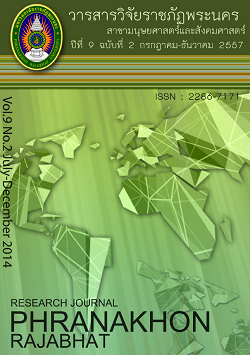การพัฒนารูปแบบการฝึกอบรมผ่านเว็บตามแนวคอนสตรัคติวิซึม สำหรับครูตำรวจตระเวนชายแดน
Main Article Content
บทคัดย่อ
ผลการวิจัย พบว่า รูปแบบการฝึกอบรมผ่านเว็บตามแนวคอนสตรัคติวิซึม (S3A e-Training Model) สำหรับครูตำรวจตระเวนชายแดน มีคุณลักษณะดังนี้ (1) การตั้งเป้าหมายการทำงาน (setting) (2) กิจกรรมและการใช้งานระบบทรัพยากร (activities) (3) การกระทำ (action) (4) การวัดและการประเมินผล (assessment and reflection) จากการ ทดลองการฝึกอบรมผ่านเว็บตามแนวคอนสตรัคติวิซึม พบว่ารูปแบบการฝึกอบรมผ่านเว็บตาม แนวคอนสตรัคติวิซึม มีประสิทธิภาพ 80.56 / 81.33 เป็นไปตามเกณฑ์ที่กำหนด ซึ่งคะแนน ผลสัมฤทธิ์ของผู้เข้ารับการฝึกอบรมด้วยรูปแบบการฝึกอบรมผ่านเว็บตามแนวคอนสตรัคติวิซึม มีคะแนนสูงกว่าคะแนนก่อนการฝึกอบรม อย่างมีนัยสำคัญทางสถิติที่ระดับ .05 และผู้เข้ารับ การฝึกอบรมมีความพึงพอใจต่อรูปแบบการฝึกอบรมผ่านเว็บตามแนวคอนสตรัคติวิซึม ในระดับ มาก
DEVELOPMENT OF THE CONSTRUCTIVIST WEB-BASED TRAINING MODEL FOR THE BORDER PATROL POLICE SCHOOLS
The purposes of this research were: 1) to develop the effective Web- Based Training Model using the Constructivism for the border patrol police schools, 2) to compare the training achievement of the trainees with the scores before receiving the Web-Based Training using Constructivism, and 3) to explore the trainees’ satisfaction of the Web-Based Training Model using the Constructivism.
The research population was 96 border patrol police schools who participated in the training program promoting educational quality to the Border Patrol Police School in the academic year 2004 from 13 schools under Border Patrol Police Sub-Division 13 of Border Patrol Police Bureau of Royal Thai Police Total of 96 people. The samples were 54 persons from 8 schools by using multi-stage sampling method. First step was cluster random sampling method which two provinces were randomized, for example Kanchanaburi province and Ratchaburi province Next step was simple random sampling which eight schools were randomized. The data were statistically analyzed using percentage, mean, standard deviation, and t-test dependent samples.
The research results revealed that:
1. The constructivist Web-Based Training Model (S3A e-Training Model) for the border patrol police schools teachers had the following characteristics: 1) setting work goals, 2) activities and resource system using 3) action, and 4) assessment and reflection.
2. The efficiency of the Web-Based Training Model using the Constructivism met the criteria at the level of 80.56 / 81.33. Moreover; the achievement scores of the border patrol police school teachers after receiving the training using the Web-Based Training Model were significantly higher than the scores before receiving the training at the statistical level of .05.
3. The trainees’ satisfaction of the constructivist Web-Based Training Model was found at a high level.
Article Details
บทความที่ได้รับการตีพิมพ์เป็นลิขสิทธิ์ของมหาวิทยาลัยราชภัฏพระนคร
ข้อความที่ปรากฏในบทความแต่ละเรื่องในวารสารวิจัยราชภัฏพระนครเล่มนี้เป็นความคิดเห็นส่วนตัวของผู้เขียนแต่ละท่านไม่เกี่ยวข้องกับมหาวิทยาลัยราชภัฏพระนคร และคณาจารย์ท่านอื่นๆในมหาวิทยาลัยฯ แต่อย่างใด ความรับผิดชอบองค์ประกอบทั้งหมดของบทความแต่ละเรื่องเป็นของผู้เขียนแต่ละท่าน หากมีความผิดพลาดใดๆ ผู้เขียนแต่ละท่านจะรับผิดชอบบทความของตนเองแต่ผู้เดียว


